- Home
- Anthony Trollope
Can You Forgive Her? Page 3
Can You Forgive Her? Read online
Page 3
VOLUME I.
CHAPTER I.
Mr. Vavasor and His Daughter.
Whether or no, she, whom you are to forgive, if you can, did or didnot belong to the Upper Ten Thousand of this our English world, I amnot prepared to say with any strength of affirmation. By blood shewas connected with big people,--distantly connected with some verybig people indeed, people who belonged to the Upper Ten Hundred ifthere be any such division but of these very big relations she hadknown and seen little, and they had cared as little for her. Hergrandfather, Squire Vavasor of Vavasor Hall, in Westmoreland, was acountry gentleman, possessing some thousand a year at the outside,and he therefore never came up to London, and had no ambition to havehimself numbered as one in any exclusive set. A hot-headed, ignorant,honest old gentleman, he lived ever at Vavasor Hall, declaring to anywho would listen to him, that the country was going to the mischief,and congratulating himself that at any rate, in his county,parliamentary reform had been powerless to alter the old politicalarrangements. Alice Vavasor, whose offence against the world I am totell you, and if possible to excuse, was the daughter of his youngerson and as her father, John Vavasor, had done nothing to raisethe family name to eminence, Alice could not lay claim to any highposition from her birth as a Vavasor. John Vavasor had come up toLondon early in life as a barrister, and had failed. He had failed atleast in attaining either much wealth or much repute, though he hadsucceeded in earning, or perhaps I might better say, in obtaining,a livelihood. He had married a lady somewhat older than himself,who was in possession of four hundred a year, and who was relatedto those big people to whom I have alluded. Who these were and thespecial nature of the relationship, I shall be called upon to explainhereafter, but at present it will suffice to say that Alice Macleodgave great offence to all her friends by her marriage. She did not,however, give them much time for the indulgence of their anger.Having given birth to a daughter within twelve months of hermarriage, she died, leaving in abeyance that question as to whetherthe fault of her marriage should or should not be pardoned by herfamily.
When a man marries an heiress for her money, if that money be withinher own control, as was the case with Miss Macleod's fortune, it isgenerally well for the speculating lover that the lady's friendsshould quarrel with him and with her. She is thereby driven to throwherself entirely into the gentleman's arms, and he thus becomespossessed of the wife and the money without the abominable nuisanceof stringent settlements. But the Macleods, though they quarrelledwith Alice, did not quarrel with her _a l'outrance_. They snubbedherself and her chosen husband; but they did not so far separatethemselves from her and her affairs as to give up the charge of herpossessions. Her four hundred a year was settled very closely onherself and on her children, without even a life interest havingbeen given to Mr. Vavasor, and therefore when she died the mother'sfortune became the property of the little baby. But, under thesecircumstances, the big people did not refuse to interest themselvesto some extent on behalf of the father. I do not suppose that anyactual agreement or compact was made between Mr. Vavasor and theMacleods; but it came to be understood between them that if he madeno demand upon them for his daughter's money, and allowed them tohave charge of her education, they would do something for him. He wasa practising barrister, though his practice had never amounted tomuch; and a practising barrister is always supposed to be capable offilling any situation which may come his way. Two years after hiswife's death Mr. Vavasor was appointed assistant commissioner in someoffice which had to do with insolvents, and which was abolished threeyears after his appointment. It was at first thought that he wouldkeep his eight hundred a year for life and be required to do nothingfor it; but a wretched cheeseparing Whig government, as John Vavasorcalled it when describing the circumstances of the arrangement to hisfather, down in Westmoreland, would not permit this; it gave him theoption of taking four hundred a year for doing nothing, or of keepinghis whole income and attending three days a week for three hoursa day during term time, at a miserable dingy little office nearChancery Lane, where his duty would consist in signing his name toaccounts which he never read, and at which he was never supposed evento look. He had sulkily elected to keep the money, and this signinghad been now for nearly twenty years the business of his life. Ofcourse he considered himself to be a very hardly-used man. One LordChancellor after another he petitioned, begging that he might berelieved from the cruelty of his position, and allowed to take hissalary without doing anything in return for it. The amount of workwhich he did perform was certainly a minimum of labour. Term time, asterms were counted in Mr. Vavasor's office, hardly comprised half theyear, and the hours of weekly attendance did not do more than makeone day's work a week for a working man; but Mr. Vavasor had beenappointed an assistant commissioner, and with every Lord Chancellorhe argued that all Westminster Hall, and Lincoln's Inn to boot, hadno right to call upon him to degrade himself by signing his name toaccounts. In answer to every memorial he was offered the alternativeof freedom with half his income; and so the thing went on.
There can, however, be no doubt that Mr. Vavasor was better off andhappier with his almost nominal employment than he would have beenwithout it. He always argued that it kept him in London but hewould undoubtedly have lived in London with or without his officialoccupation. He had become so habituated to London life in a smallway, before the choice of leaving London was open to him, thatnothing would have kept him long away from it. After his wife's deathhe dined at his club every day on which a dinner was not given to himby some friend elsewhere, and was rarely happy except when so dining.They who have seen him scanning the steward's list of dishes, andgiving the necessary orders for his own and his friend's dinner, atabout half past four in the afternoon, have seen John Vavasor atthe only moment of the day at which he is ever much in earnest. Allother things are light and easy to him,--to be taken easily and to bedismissed easily. Even the eating of the dinner calls forth from himno special sign of energy. Sometimes a frown will gather on his browas he tastes the first half glass from his bottle of claret; but asa rule that which he has prepared for himself with so much elaboratecare, is consumed with only pleasant enjoyment. Now and again it willhappen that the cook is treacherous even to him, and then he can hithard; but in hitting he is quiet, and strikes with a smile on hisface.
Such had been Mr. Vavasor's pursuits and pleasures in life up to thetime at which my story commences. But I must not allow the reader tosuppose that he was a man without good qualities. Had he when youngpossessed the gift of industry I think that he might have shone inhis profession, and have been well spoken of and esteemed in theworld. As it was he was a discontented man, but nevertheless he waspopular, and to some extent esteemed. He was liberal as far as hismeans would permit; he was a man of his word; and he understood wellthat code of by-laws which was presumed to constitute the characterof a gentleman in his circle. He knew how to carry himself well amongmen, and understood thoroughly what might be said, and what mightnot; what might be done among those with whom he lived, and whatshould be left undone. By nature, too, he was kindly disposed, lovingmany persons a little if he loved few or none passionately. Moreover,at the age of fifty, he was a handsome man, with a fine forehead,round which the hair and beard was only beginning to show itself tobe grey. He stood well, with a large person, only now beginning tobecome corpulent. His eyes were bright and grey, and his mouth andchin were sharply cut, and told of gentle birth. Most men who knewJohn Vavasor well, declared it to be a pity that he should spend histime in signing accounts in Chancery Lane.
I have said that Alice Vavasor's big relatives cared but little forher in her early years; but I have also said that they were carefulto undertake the charge of her education, and I must explain awaythis little discrepancy. The biggest of these big people had hardlyheard of her; but there was a certain Lady Macleod, not very bigherself, but, as it were, hanging on to the skirts of those whowere so, who cared very much for Alice. She was the widow of a SirArchibald Macleod, K.C.B., who had been a soldier,
she herself havingalso been a Macleod by birth; and for very many years past--froma time previous to the birth of Alice Vavasor--she had lived atCheltenham, making short sojourns in London during the spring, whenthe contents of her limited purse would admit of her doing so. Ofold Lady Macleod I think I may say that she was a good woman;--thatshe was a good woman, though subject to two of the most seriousdrawbacks to goodness which can afflict a lady. She was a CalvinisticSabbatarian in religion, and in worldly matters she was a devoutbeliever in the high rank of her noble relatives. She could almostworship a youthful marquis, though he lived a life that woulddisgrace a heathen among heathens; and she could and did, in her ownmind, condemn crowds of commonplace men and women to all eternaltorments of which her imagination could conceive, because theylistened to profane music in a park on Sunday. Yet she was a goodwoman. Out of her small means she gave much away. She owed no mananything. She strove to love her neighbours. She bore much pain withcalm unspeaking endurance, and she lived in trust of a better world.Alice Vavasor, who was after all only her cousin, she loved with anexceeding love, and yet Alice had done very much to extinguish suchlove. Alice, in the years of her childhood, had been brought up byLady Macleod; at the age of twelve she had been sent to a school atAix-la-Chapelle,--a comitatus of her relatives having agreed thatsuch was to be her fate, much in opposition to Lady Macleod'sjudgement; at nineteen she had returned to Cheltenham, and afterremaining there for little more than a year, had expressed herunwillingness to remain longer with her cousin. She could sympathizeneither with her relative's faults or virtues. She made anarrangement, therefore, with her father, that they two would keephouse together in London, and so they had lived for the last fiveyears;--for Alice Vavasor when she will be introduced to the readerhad already passed her twenty-fourth birthday.
Their mode of life had been singular and certainly not in allrespects satisfactory. Alice when she was twenty-one had the fullcommand of her own fortune; and when she induced her father, who forthe last fifteen years had lived in lodgings, to take a small housein Queen Anne Street, of course she offered to incur a portion ofthe expense. He had warned her that his habits were not those of adomestic man, but he had been content simply so to warn her. He hadnot felt it to be his duty to decline the arrangement because he knewhimself to be unable to give to his child all that attention whicha widowed father under such circumstances should pay to an onlydaughter. The house had been taken, and Alice and he had livedtogether, but their lives had been quite apart. For a short time, fora month or two, he had striven to dine at home and even to remain athome through the evening; but the work had been too hard for him andhe had utterly broken down. He had said to her and to himself thathis health would fail him under the effects of so great a change madeso late in life, and I am not sure that he had not spoken truly. Atany rate the effort had been abandoned, and Mr. Vavasor now neverdined at home. Nor did he and his daughter ever dine out together.Their joint means did not admit of their giving dinners, andtherefore they could not make their joint way in the same circle. Itthus came to pass that they lived apart,--quite apart. They saw eachother, probably daily; but they did little more than see each other.They did not even breakfast together, and after three o'clock in theday Mr. Vavasor was never to be found in his own house.
Miss Vavasor had made for herself a certain footing in society,though I am disposed to doubt her right to be considered as holdinga place among the Upper Ten Thousand. Two classes of people she hadchosen to avoid, having been driven to such avoidings by her aunt'spreferences; marquises and such-like, whether wicked or otherwise,she had eschewed, and had eschewed likewise all Low Churchtendencies. The eschewing of marquises is not generally verydifficult. Young ladies living with their fathers on very moderateincomes in or about Queen Anne Street are not usually much troubledon that matter. Nor can I say that Miss Vavasor was so troubled. Butwith her there was a certain definite thing to be done towards sucheschewal. Lady Macleod by no means avoided her noble relatives,nor did she at all avoid Alice Vavasor. When in London she waspersevering in her visits to Queen Anne Street, though she consideredherself, nobody knew why, not to be on speaking terms with Mr.Vavasor. And she strove hard to produce an intimacy between Aliceand her noble relatives--such an intimacy as that which she herselfenjoyed;--an intimacy which gave her a footing in their houses but nofooting in their hearts, or even in their habits. But all this Alicedeclined with as much consistency as she did those other struggleswhich her old cousin made on her behalf,--strong, never-flagging,but ever-failing efforts to induce the girl to go to such places ofworship as Lady Macleod herself frequented.
A few words must be said as to Alice Vavasor's person one factalso must be told, and then, I believe, I may start upon my story.As regards her character, I will leave it to be read in the storyitself. The reader already knows that she appears upon the scene atno very early age, and the mode of her life had perhaps given to heran appearance of more years than those which she really possessed. Itwas not that her face was old, but that there was nothing that wasgirlish in her manners. Her demeanour was as staid, and her voiceas self-possessed as though she had already been ten years married.In person she was tall and well made, rather large in her neck andshoulders, as were all the Vavasors, but by no means fat. Her hairwas brown, but very dark, and she wore it rather lower upon herforehead than is customary at the present day. Her eyes, too, weredark, though they were not black, and her complexion, though notquite that of a brunette, was far away from being fair. Her nose wassomewhat broad, and _retrousse_ too, but to my thinking it was acharming nose, full of character, and giving to her face at times alook of pleasant humour, which it would otherwise have lacked. Hermouth was large, and full of character, and her chin oval, dimpled,and finely chiselled, like her father's. I beg you, in taking her forall in all, to admit that she was a fine, handsome, high-spiritedyoung woman.
And now for my fact. At the time of which I am writing she wasalready engaged to be married.

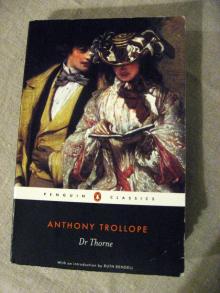 Doctor Thorne
Doctor Thorne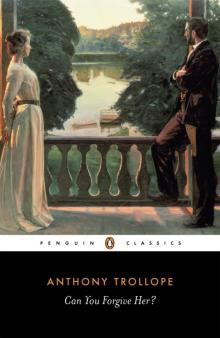 Can You Forgive Her?
Can You Forgive Her?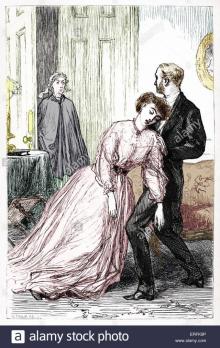 The Last Chronicle of Barset
The Last Chronicle of Barset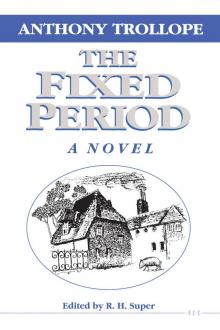 The Fixed Period
The Fixed Period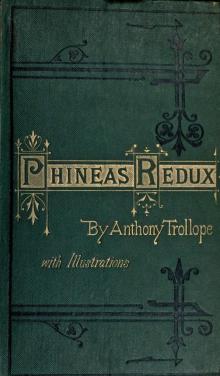 Phineas Redux
Phineas Redux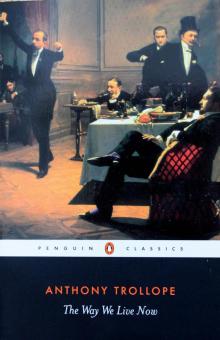 The Way We Live Now
The Way We Live Now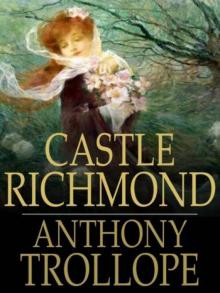 Castle Richmond
Castle Richmond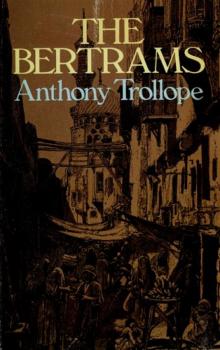 The Bertrams
The Bertrams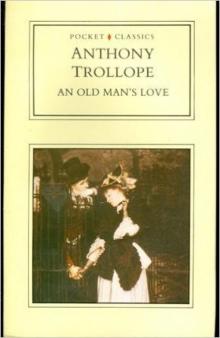 An Old Man's Love
An Old Man's Love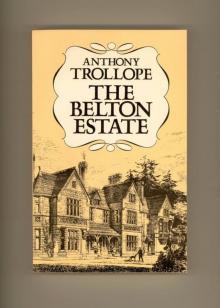 The Belton Estate
The Belton Estate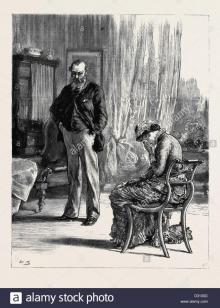 Marion Fay: A Novel
Marion Fay: A Novel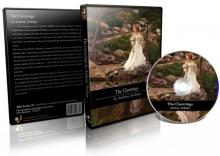 The Claverings
The Claverings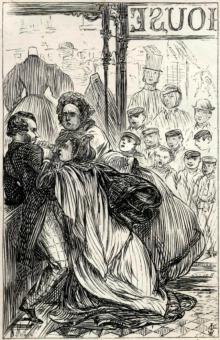 The Struggles of Brown, Jones, and Robinson
The Struggles of Brown, Jones, and Robinson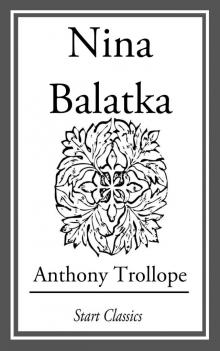 Nina Balatka
Nina Balatka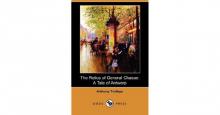 The Relics of General Chasse: A Tale of Antwerp
The Relics of General Chasse: A Tale of Antwerp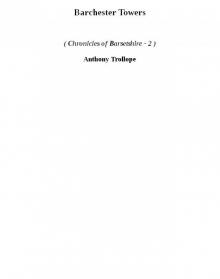 Barchester Towers cob-2
Barchester Towers cob-2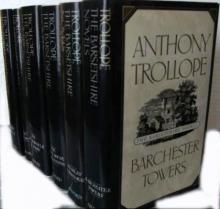 The Chronicles of Barsetshire
The Chronicles of Barsetshire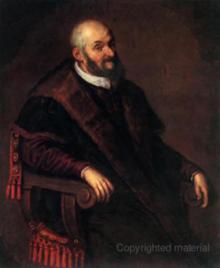 The Warden cob-1
The Warden cob-1 Framley Parsonage
Framley Parsonage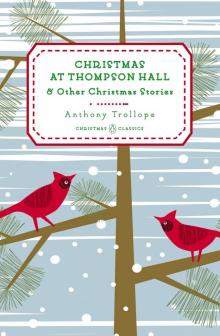 Christmas at Thompson Hall
Christmas at Thompson Hall The Warden
The Warden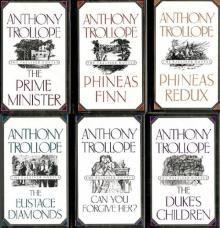 The Palliser Novels
The Palliser Novels The Small House at Allington
The Small House at Allington Barchester Towers
Barchester Towers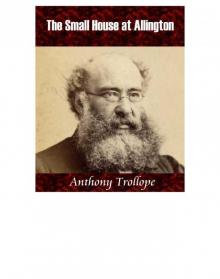 The Small House at Allington cob-5
The Small House at Allington cob-5 The Duke's Children
The Duke's Children Phineas Finn, the Irish Member
Phineas Finn, the Irish Member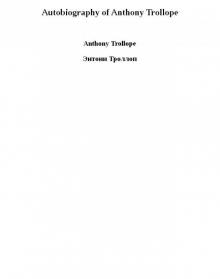 Autobiography of Anthony Trollope
Autobiography of Anthony Trollope